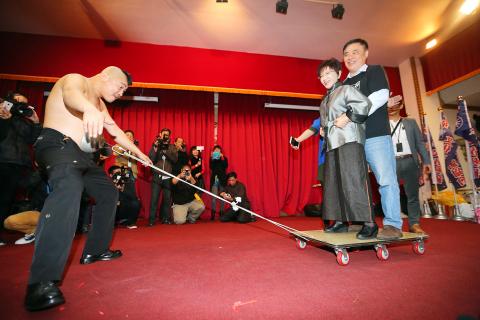Chinese Nationalist Party (KMT) heavyweights yesterday continued to exchange barbs over the moving forward of the party’s chairperson election by two months.
The KMT Central Standing Committee on Wednesday passed a motion to change the scheduled date for the chairperson election with fewer than 10 of the 40 committee members present, which was lower than the quorum of 20 for the meeting to be valid.
Unnamed sources said that at least 26 committee members were absent with the aim of boycotting the meeting.

Photo: CNA
Despite the party’s regulations of what constitutes a quorum, KMT headquarters said it was using a definition of a quorum provided by the Ministry of the Interior, that set the quorum as the total number of members minus those who called in sick or who were absent due to business.
It said that according to that definition, the quorum was met for the meeting to pass the motion.
KMT Vice Chairman Hau Lung-bin (郝龍斌), who questioned the legitimacy of the meeting on Thursday, yesterday again called for a discussion about the election date at the committee’s meeting next week and said that party headquarters should allow the discussion with “sincerity and open-mindedness.”
Asked about committee member Yao Chiang-lin’s (姚江臨) protest about the validity of the meeting and his claim that he would take legal action against KMT Chairwoman Hung Hsiu-chu (洪秀柱), Hau said he hoped that an internal discussion on reaching a consensus would take place first.
Former vice president Wu Den-yih (吳敦義), who has been widely tipped to run for chairman, also took issue with the decision, saying that not following the party’s rules would incur criticism and disapproval, which damages “the party’s image of solidarity.”
Committee member Sean Lien (連勝文), son of former party chairman Lien Chan (連戰), weighed in by criticizing KMT headquarters for “suppressing different opinions with force rather than undertaking communication and coordination.”
Sean Lien said he used to feel sorry for Hung, as he believed that she deserved an apology from the party when she was, using “questionable procedures,” replaced by then-KMT chairman Eric Chu (朱立倫) as the party’s presidential candidate last year.
“But I was dumbfounded by the meeting on Wednesday. The forced change to the party’s rules by suppressing different opinions repeated itself, only now the past victim has become the new wielder of power,” he said.
In response to Sean Lien’s criticism, Hung said it was a “misunderstanding” and that she hopes those who hold positions on the committee would attend all its meetings to remain well-informed.
Hung said she was “very sorry to hear that” when asked about Yao’s plan to take legal action, adding that it was actually Yao who proposed moving the date of the election.

Alain Robert, known as the "French Spider-Man," praised Alex Honnold as exceptionally well-prepared after the US climber completed a free solo ascent of Taipei 101 yesterday. Robert said Honnold's ascent of the 508m-tall skyscraper in just more than one-and-a-half hours without using safety ropes or equipment was a remarkable achievement. "This is my life," he said in an interview conducted in French, adding that he liked the feeling of being "on the edge of danger." The 63-year-old Frenchman climbed Taipei 101 using ropes in December 2004, taking about four hours to reach the top. On a one-to-10 scale of difficulty, Robert said Taipei 101

A preclearance service to facilitate entry for people traveling to select airports in Japan would be available from Thursday next week to Feb. 25 at Taiwan Taoyuan International Airport, Taoyuan International Airport Corp (TIAC) said on Tuesday. The service was first made available to Taiwanese travelers throughout the winter vacation of 2024 and during the Lunar New Year holiday. In addition to flights to the Japanese cities of Hakodate, Asahikawa, Akita, Sendai, Niigata, Okayama, Takamatsu, Kumamoto and Kagoshima, the service would be available to travelers to Kobe and Oita. The service can be accessed by passengers of 15 flight routes operated by

Taiwanese and US defense groups are collaborating to introduce deployable, semi-autonomous manufacturing systems for drones and components in a boost to the nation’s supply chain resilience. Taiwan’s G-Tech Optroelectronics Corp subsidiary GTOC and the US’ Aerkomm Inc on Friday announced an agreement with fellow US-based Firestorm Lab to adopt the latter’s xCell, a technology featuring 3D printers fitted in 6.1m container units. The systems enable aerial platforms and parts to be produced in high volumes from dispersed nodes capable of rapid redeployment, to minimize the risk of enemy strikes and to meet field requirements, they said. Firestorm chief technology officer Ian Muceus said

MORE FALL: An investigation into one of Xi’s key cronies, part of a broader ‘anti-corruption’ drive, indicates that he might have a deep distrust in the military, an expert said China’s latest military purge underscores systemic risks in its shift from collective leadership to sole rule under Chinese President Xi Jinping (習近平), and could disrupt its chain of command and military capabilities, a national security official said yesterday. If decisionmaking within the Chinese Communist Party has become “irrational” under one-man rule, the Taiwan Strait and the regional situation must be approached with extreme caution, given unforeseen risks, they added. The anonymous official made the remarks as China’s Central Military Commission Vice Chairman Zhang Youxia (張又俠) and Joint Staff Department Chief of Staff Liu Zhenli (劉振立) were reportedly being investigated for suspected “serious